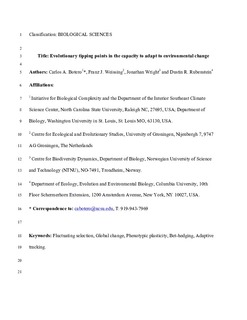Evolutionary tipping points in the capacity to adapt to environmental change
Journal article, Peer reviewed
Accepted version
Permanent lenke
http://hdl.handle.net/11250/2468769Utgivelsesdato
2015Metadata
Vis full innførselSamlinger
- Institutt for biologi [2575]
- Publikasjoner fra CRIStin - NTNU [38127]
Originalversjon
Proceedings of the National Academy of Sciences of the United States of America. 2015, 112 (1), 184-189. 10.1073/pnas.1408589111Sammendrag
In an era of rapid climate change, there is a pressing need to understand how organisms will cope with faster and less predictable variation in environmental conditions. Here we develop a unifying model that predicts evolutionary responses to environmentally driven fluctuating selection and use this theoretical framework to explore the potential consequences of altered environmental cycles. We first show that the parameter space determined by different combinations of predictability and timescale of environmental variation is partitioned into distinct regions where a single mode of response (reversible phenotypic plasticity, irreversible phenotypic plasticity, bet-hedging, or adaptive tracking) has a clear selective advantage over all others. We then demonstrate that, although significant environmental changes within these regions can be accommodated by evolution, most changes that involve transitions between regions result in rapid population collapse and often extinction. Thus, the boundaries between response mode regions in our model correspond to evolutionary tipping points, where even minor changes in environmental parameters can have dramatic and disproportionate consequences on population viability. Finally, we discuss how different life histories and genetic architectures may influence the location of tipping points in parameter space and the likelihood of extinction during such transitions. These insights can help identify and address some of the cryptic threats to natural populations that are likely to result from any natural or human-induced change in environmental conditions. They also demonstrate the potential value of evolutionary thinking in the study of global climate change.
